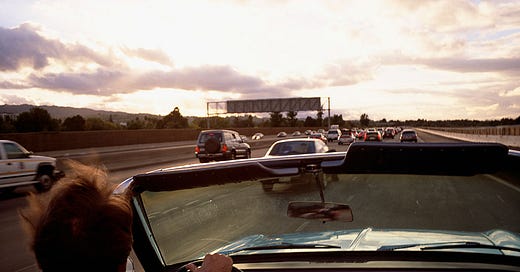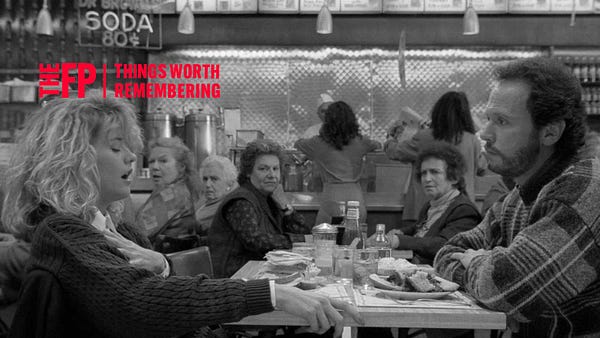
The Free Press

When I was in high school in 2006, I had a group of six guy friends. All of us grew up poor, and none of us had much interest in college. Yet every single one of us cared deeply about one thing: getting a car as soon as possible.
We all managed to secure part-time jobs after class to pay for driver’s ed and buy our own wheels. When I was 16, I made $6.75 an hour (the California minimum wage at that time) and I finally achieved my dream of becoming the proud licensed owner of a dilapidated 1992 Ford Escort. It cost me $1,400.
Nothing—nothing—could match the exhilaration of roaring away from school during lunch period, with a girl riding shotgun, on our way to Del Taco.
That was less than two decades ago, when more than 80 percent of American 18-year-olds were licensed to drive. Now, that number has plummeted to just 60 percent. This means that about 1.5 million newly minted adults have no idea what it feels like to get behind the wheel.
Why is that?
Part of it is laziness. Ride-sharing apps like Lyft and Uber give kids an easy way to skip the nerve-wracking process of having to merge on the highway.
It’s also possible today’s teens are put off by the cost of getting a car or even a license. Inflation surely doesn’t help. But if a lack of money were a problem for America’s youth, you’d expect more of them to be looking for work. Yet fewer teenagers have jobs now compared with decades past, and fewer are seeking employment. Between 2005 and 2018, the percentage of 16- to 19-year-olds who participated in the workforce fell from 45 percent to 35 percent.
Until recently, getting a driver’s license was seen as a rite of passage for U.S. teenagers. It was even enshrined in law by the Supreme Court, which said in 1977 that having a car was a “virtual necessity” for anyone living in America.
That’s not true anymore. And that’s the problem.
In the past, the car represented the ultimate escape, a portal to exciting opportunities, risk-taking, and adventure. It was the only way a teenage boy could get out of the house, hang out with his friends, impress a romantic interest, and even get laid in the backseat. In the primitive MySpace era of the mid-2000s, digital communications were still too unsophisticated to offer any of that to a teen spending the weekend at home on his own.
Now teenagers don’t seem to go anywhere at all, or at least anywhere that requires a car.
Instead, they go deep into apps, social media, and online porn. As psychologist Jean Twenge notes in her book about Gen Z: “The party is on Instagram and Snapchat now.”
And when you don’t ride in cars with other boys and girls, you don’t tend to do the things that teenagers do in the backseat. Though perhaps Gen Zers would argue that you don’t need a car to get laid anymore because you can have synthetic sex at home.
In 2015, a Journal of Sex Research paper reported that 67 percent of male college students agreed that viewing pornography is “an acceptable way to express one’s sexuality,” while only 37 percent of their fathers felt the same way. This generational divide stems from the “Triple A” theory of online porn: internet access offers affordable content with complete anonymity. The result? OnlyFans, the site that features real-life sex workers, currently boasts an incredible one billion visits a month. (Not even Playboy, which had a global circulation of more than five million readers in its 1970s heyday, could claim that kind of reach.) Meanwhile, the rise of AI promises to please an even greater array of fantasies. One app, Replika, which brings an “AI girlfriend” chatbot to your phone, already has ten million users, mainly men.
When such pleasures abound on your digital devices, why would any teen boy get in a car and leave the house?
They don’t.
Alongside the decline in teen driving and employment, study after study shows that young people are having less sex, even as sexual norms have grown more permissive. The decline has been particularly pronounced among men, with almost 30 percent of those under thirty reportedly not having sex even once in the past year, a figure that tripled between 2008 and 2018.
Sex is not the only risky thing that Gen Zers are having less of. They are generally disinclined toward danger and risk-taking. Teenagers used to flout advice about physical safety. Gen Z is different. Rather than rejecting safety, they have embraced it.
Jean Twenge writes that fewer kids get their driver’s licenses now because they seek “emotional safety.” It’s true that our old, analog world gave us very little of that. Before the era of streaming, people had to face the potential embarrassment of shopping in the adult section of the video store if they wanted to purchase porn. Before the era of dating apps, we had to fumble our way through arranging dates in person or on the phone. Before ride-sharing apps, we actually had to grit our teeth and learn how to drive. We were forced to barrel down the highway at 65 mph or faster, knowing that a car in front could unexpectedly swerve, an accident could happen, death could arrive at any turn.
Now we have a world without danger, a world of near-total safety, but has it led to more satisfaction? The answer appears to be no. As Jonathan Haidt has pointed out, rates of depression and anxiety among young people have soared in recent years, a trend that started well before the Covid-19 pandemic. Indeed, there has been a stunning rise in self-derogation among teenagers (e.g., agreement with statements like “Sometimes I think I am no good at all” and “I feel that my life is not very useful”). Perhaps some risk and even a bit of danger is necessary to cultivate a sense of vitality and self-esteem. Digital communication has supplanted real social interactions, reducing the mischief and misadventure that formerly characterized teenage life.
For me, the memory of zooming along California’s Interstate 505 with the windows rolled down will forever be etched in my mind—snapshots of individuality, exploration, and just the slightest hint of danger. I wonder, will the boys of today enjoy those same pleasures, too?
Or will technology keep leading them on off-ramps to nowhere, as they increasingly get left behind in the dust?
Rob Henderson coined the term “luxury belief.” You can follow him on Substack here. Read his last piece for The Free Press: “Dropping the SATs Hurts Poor Kids.”
And for more smart takes on the culture, subscribe to The Free Press today:
















This appears to be half "kids these days" (https://www.ncbi.nlm.nih.gov/pmc/articles/PMC6795513/) and half an odd assortment of potentially concerning but maybe unrelated vignettes smashed together to suggest causality.
<<Until recently, getting a driver’s license was seen as a rite of passage for U.S. teenagers.>>
Well, from 1940 or so. About 3 generations.
<<...1977... having a car was a “virtual necessity” for anyone living in America.>>
Yes, but that works equally as a critique of US postwar urban planning.
<<death around every corner>>
I agree we overdo it, but survivor bias makes an ironic battle cry.
There are at least 6 interesting developments in here that MIGHT be related but would be far more convincing treated separately or in smaller groups. Stuck together like this, mostly what I hear is "I don't like it."
I've known to hang in dark pits off ropes and turn airplanes upside down. Not at the same time. Yet. And I drive everywhere, but I wouldn't pin any substantial critique in this article on *driving* being essential to life, freedom, or America. It's been a central James-Dean part of our culture for 3 generations. But I could take it or leave it. Maybe not you, and that's fine, but the country as a whole could -- it did. Now... the *Frontier* has been there since the beginning. And what else will replace it?
Also, get off my lawn? ;-)
For a deeper dive on this subject, read Matthew Crawford's "Why We Drive." One of the most important books I have read in years.